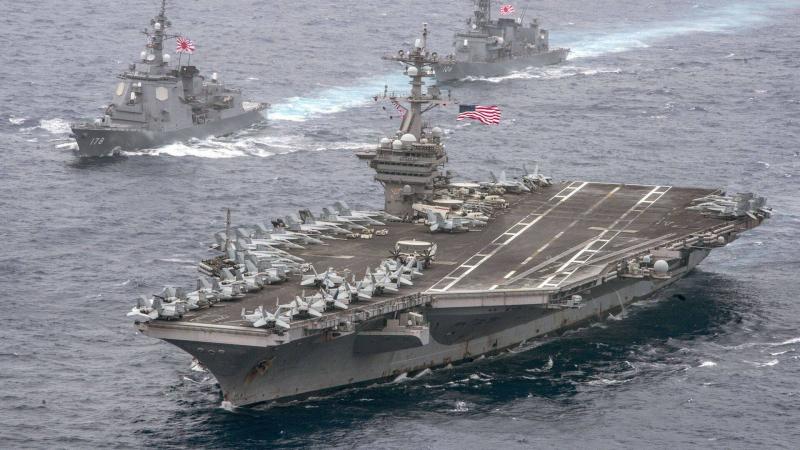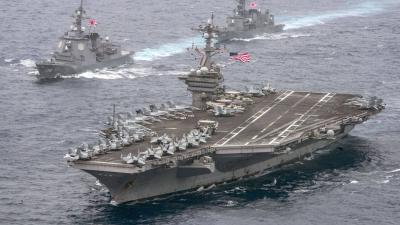With the onset of the surprise attack launched by the Palestinian Islamic Resistance Movement (Hamas) on Israel on October 7, and the beginning of the Israeli counter-operation in Gaza, the Houthis announced their support for the Palestinian people and vowed to respond to events in the sector. The "Ansar Allah" movement translated its promises into large bursts of ballistic and cruise missiles, along with a significant number of drones targeting the southern outskirts of Israel. However, they often failed to achieve their goals in Eilat, and the U.S. navy fleet operating in the Red Sea intercepted many of them, while Israel deployed space defense missiles, effectively deterring the Houthi plans.
Nonetheless, the prolonged duration of the battle and the escalation of Israeli actions in the sector prompted a reciprocal escalation and a change in the Yemeni strategy, making it more painful. The Houthis initiated a "war on ships" by a documented assault on the "Galaxy Leader," owned by an Israeli businessman, threatening the captains of those Israeli ships and those headed to Israeli ports.
The Houthi threats in the Red Sea led Israeli shipping companies to radically change their routes, forcing them to navigate around half the globe to enter the Mediterranean through the Strait of Gibraltar, instead of passing through the Red Sea via Bab el-Mandeb and crossing the Suez Canal. With the outbreak of maritime conflict in the Bab el-Mandeb Strait and escalating tensions in the Red Sea, what is this vital waterway and what is its importance for Israeli navigation? Due to these factors, and with many vessels linked to Israel having to sail around Africa, the journey time for these ships is expected to extend by two weeks, significantly increasing transportation costs and insurance values on goods. This situation reflects on the prices of imported and exported goods.
After shipping prices to and from Israel rose following the outbreak of war in Gaza, data from "Fretus" showed an additional increase in the cost of shipping any container from China to the Israeli port of Ashdod, ranging between 9% and 14% in the last two weeks of October, prior to the action taken by "Ansar Allah" against Israeli ships in Bab el-Mandeb.
It is worth noting that the Organization for Economic Cooperation and Development warned of the intensification of the war in the Middle East and its widening scope, as it would affect the global economy through oil and gas prices, with a $10 increase in barrel prices potentially leading to a 0.2-point rise in global inflation in the first year and a 0.1-point decrease in growth. They confirmed that trade could be significantly impacted due to the presence of two international trade routes in the conflict region: the Strait of Hormuz and the Suez Canal.
Regarding the location of Bab el-Mandeb, Israel regards the Red Sea as having a particularly strategic position, as it is considered its trade outlet with Asian countries. Bab el-Mandeb is a waterway located in the southern Red Sea, separating the southern coast of Yemen to the west from Djibouti and Somalia to the east, and also separating the continents of Asia and Africa, as it is situated in the midst of the five continents. It is considered one of the strategic waterways, linking the Red Sea with the Arabian Sea. The strait is approximately 30 kilometers wide and is divided by Perim Island, located to its east and measuring two square kilometers, into two channels: the eastern channel known as "Bab Iskander," which is three kilometers wide and 30 meters deep, and the western channel named "Dakat al-Mayon," which is about 25 kilometers wide and 310 meters deep.
Geological studies indicate that the strait emerged due to the divergence of Africa from Asia as a result of the Syrian-African rift that formed the Red Sea in the late Tertiary geological period. The importance of Bab el-Mandeb increased after the opening of the Suez Canal in 1869, which connected the Mediterranean Sea with the Red Sea, linking trade between Europe and the Indian Ocean countries and East Africa. Additionally, the width of the ship transit channel between Perim Island and the African mainland is 16 kilometers, with a depth of 100-200 meters, allowing ships and oil tankers to easily navigate in both directions. The distance between the shores of the strait is 30 kilometers from Ras Manhal on the Asian side to Ras Siyan on the African side.
Oil has further amplified the importance of the strait due to its suitable width and depth for the passage of oil tankers in both directions, with more than 21,000 vessels passing through annually, or approximately 57 vessels daily. The strait also holds significant military and security importance; it was previously closed by Egypt against Israel during the 1973 war, and after the September 11 attacks in the United States in 2001, American forces worked to secure navigation in the strait against al-Qaeda and pirates in the region.
Moreover, it is essential to note that global trading companies have canceled transactions with Israel, fearing attacks on their ships in the Red Sea, and insurance companies have doubled the shipping insurance rates for transporting goods to and from Israel. This situation will result in international pressure on Israel to stop the war on Gaza, while some countries, including Russia, have warned the United States against direct involvement in war with Yemen, potentially changing equations and maps in the region.




